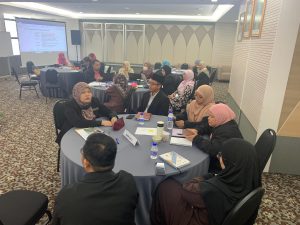
Continuous improvements will boost the image of Shariah judicial and legal institutions in dealing with complex cases
by RAHIMI YUNUS / pic by RAZAK GHAZALI
SHARIAH courts in the country must prioritise the use of new technology in the time of Covid-19 to provide services and serve justice effectively as required by the religion, Prime Minister (PM) Tan Sri Muhyiddin Yassin (picture; centre) said.
“I believe continuous improvements will boost the image of Shariah judicial and legal institutions in dealing with cases that are increasingly complex and challenging, as well as fulfilling the needs of the Muslim community as a whole,” Muhyiddin said at the 2020 Nusantara Syariah Law and Judiciary Conference launch in Sepang, Selangor, yesterday.
He added that the Perikatan Nasional government is committed to supporting efforts to uphold the dignity of the Shariah law and judiciary in Malaysia, including enhancing Shariah courts’ jurisdiction and appointment of Syarie judges.
According to Shariah Judiciary Department (JKSM) DG and Syarie Chief Judge Datuk Dr Mohd Na’im Mokhtar, cases in Shariah courts have consistently increased over 100,000 cases in every five years.
From 2014 to 2018, 616,707 cases were filed in Shariah courts, said Mohd Na’im during his opening remark at the conference.
He said JKSM has recommended several measures to enhance the status of the Syarie chief judge and Syarie judges across the country as stated in a proposal paper presented on Feb 6 this year.
Among the recommendations are a JKSM restructuring through an establishment of a Shariah judicial commission to separate the power between the judiciary, legislature and executive; coordination and standardisation of laws throughout Malaysia; establishment of Court of Appeal at the federal level; and extension of the jurisdiction in criminal and civil.
Meanwhile, the PM said efforts rolled out by the government to fight the Covid-19 pandemic is guided by the “Maqasid Shariah”, or objectives of Shariah principles.
This concept provides a framework in finding solutions to protect human interests, while complying with God’s will, mainly to protect the five elements namely faith or religion (hifzu al-din), life (hifzu al-nafs), lineage (hifzu al-nasb), intellect (hifzu al-aql) and property (hifzu al-mal).
For example, Muhyiddin said the decision to implement the Movement Control Order (MCO) to curb the spread of Covid-19 is in tandem with the protection of life principle.
He added that the need to reopen mosques and surau, as well as allowing congregational prayers under new norms, is balanced between the protection of faith and protection of life principles.
“In the spirit of ‘Malaysia Prihatin’ (Malaysia Cares), the government has taken proactive measures to implement several phases of the MCO.
“To date, we are still in the Recovery MCO to preserve the protection of safety and lives of the people from Covid-19 threats,” he said.
The 2020 Nusantara Shariah Law and Judiciary Conference was attended by some 580 participants among Shariah officers in Malaysia, Brunei, Indonesia and Singapore.
With a theme to cultivate Maqasid Shariah applications in Shariah judicial and legal systems under the new normal, the conference seeked to improve Shariah judicial services delivery amid the pandemic based on experiences gathered by regional countries.
Sumber: The Malaysian Reserve
Last Updated on December 10, 2021













